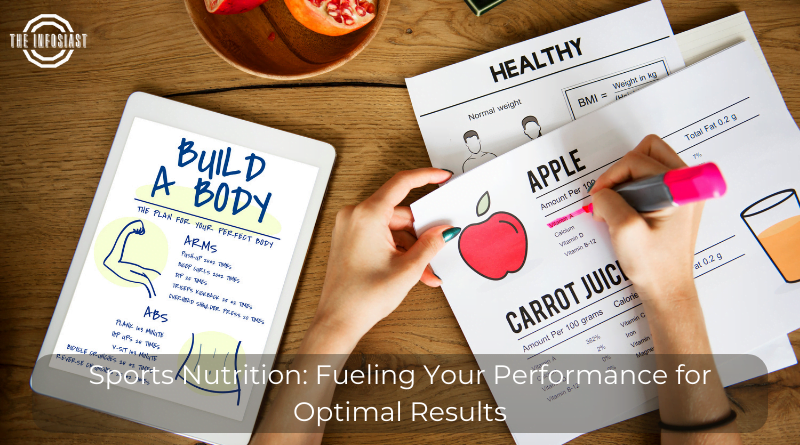
When it comes to sports and athletic performance, proper nutrition plays a vital role in fueling your body for optimal results. Whether you’re a professional athlete or a fitness enthusiast, understanding sports nutrition is crucial to enhance performance, promote recovery, and achieve your fitness goals. In this comprehensive guide, we will explore the key aspects of sports nutrition, providing you with valuable insights and practical tips to maximize your athletic potential.
The Importance of Sports Nutrition
Fueling Performance:
Sports nutrition is all about providing your body with the right nutrients to fuel performance. Properly balanced meals and strategic nutrient timing can optimize energy levels, improve endurance, and enhance overall athletic performance.
Promoting Recovery:
Intense physical activity places stress on the body. Adequate nutrition after exercise is essential to support muscle repair, replenish glycogen stores, and promote optimal recovery. The right nutrition can reduce muscle soreness and accelerate the healing process.
Key Components of Sports Nutrition
Macronutrients:
Carbohydrates:
Carbohydrates are the primary source of fuel for athletes. Opt for complex carbohydrates like whole grains, fruits, and vegetables, as they provide sustained energy release. Timing your carbohydrate intake around workouts can optimize performance and glycogen replenishment.
Protein:
Protein is essential for muscle repair and growth. Including lean sources of protein such as chicken, fish, tofu, and beans in your diet supports muscle recovery and aids in building strength. Aim for a balanced protein intake throughout the day.
Fats:
Healthy fats, such as those found in avocados, nuts, and olive oil, provide essential fatty acids and contribute to overall health. While fats should be consumed in moderation, they are important for hormone production and nutrient absorption.
Micronutrients:
Vitamins and Minerals:
A well-rounded sports nutrition plan should include a variety of fruits, vegetables, and whole foods to ensure an adequate intake of vitamins and minerals. These micronutrients are involved in numerous physiological processes that support athletic performance and recovery.
Hydration:
Proper hydration is crucial for athletes to maintain optimal performance. Drink fluids regularly, especially before, during, and after exercise. Water is generally sufficient for hydration, but electrolyte-rich beverages may be necessary for longer or more intense workouts.
Pre- and Post-Workout Nutrition Strategies
Pre-Workout Nutrition:
Timing:
Consume a balanced meal or snack containing carbohydrates and protein 2-3 hours before exercise to ensure proper digestion and sustained energy release. If time is limited, opt for a lighter snack 30-60 minutes prior to training.
Examples:
A pre-workout meal could consist of oatmeal topped with berries and a side of Greek yogurt, while a pre-workout snack might be a banana with a handful of almonds or a protein smoothie.
Post-Workout Nutrition:
Timing:
The post-workout period is crucial for replenishing glycogen stores and promoting muscle recovery. Consume a snack or meal containing carbohydrates and protein within 30-60 minutes after exercise to optimize recovery.
Examples:
A post-workout meal could include grilled chicken breast, quinoa, and roasted vegetables, while a post-workout snack might be a protein shake with a banana or a turkey and avocado wrap.
Tailoring Sports Nutrition to Your Specific Needs
Individual Differences:
Every athlete has unique nutritional needs based on factors such as body composition, training intensity, and specific sport requirements. Consulting a registered dietitian who specializes in sports nutrition can help you create a personalized plan that optimizes your performance.
Supplementation:
While a well-balanced diet should be the foundation of sports nutrition, certain supplements may be beneficial for athletes. However, it is crucial to consult with a healthcare professional before incorporating any supplements into your regimen.
Sports nutrition is a cornerstone of athletic success. By understanding the importance of macronutrients, micronutrients, and proper timing, you can fuel your body effectively, enhance performance, and optimize recovery. Remember, nutrition is not a one-size-fits-all approach. Tailor your sports nutrition plan to meet your specific needs and consult with professionals to ensure you’re getting the most out of your diet. By prioritizing sports nutrition, you’ll be on your way to achieving optimal results in your athletic endeavors.



